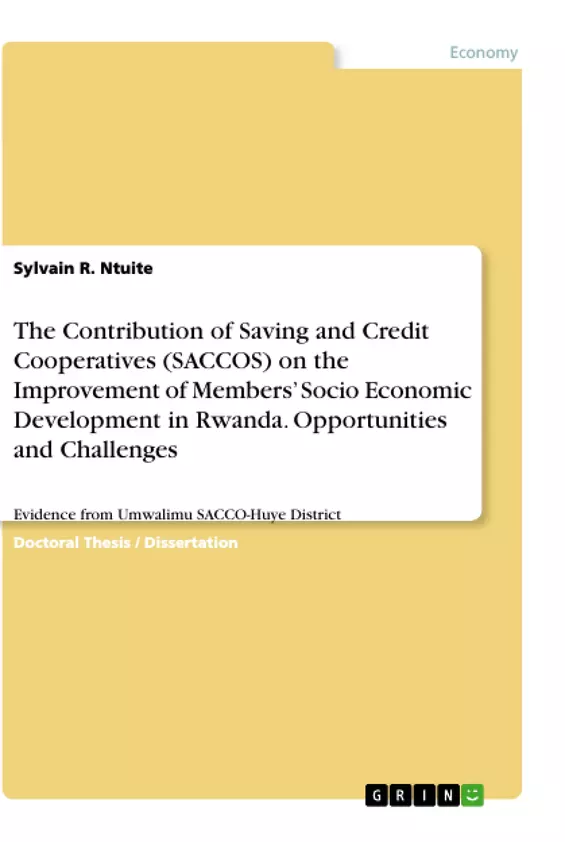This study examines the contribution of saving and credit cooperatives (SACCOS) on the improvement of members’ socio economic development in Rwanda. The appearance of saving and credit cooperatives or credit unions has been known as remedy for social ills rooted in poverty because of its efficiency in loans or credits dispensation, social equality for enhancement and reduction of poverty among low income earners. Therefore, millions and millions of poor people and non-bankable in developing countries (or third world countries) have been provided access to formal financial services through saving and credit cooperatives’ programs.
The targeted population concerned by the study was 1,940 members of USACCO from which a sample of 92 respondents was purposely selected. The study has adopted a combination of correlation and descriptive research design. It has employed both quantitative and qualitative approaches. The study used both primary and secondary data. The primary data was collected using questionnaire and interview and, while secondary data was collected using documentations techniques whereby, Manual of procedures and Credit policies of USACCO and financial reports have been consulted. The analysis of data was done using SPSS version 21.
Inhaltsverzeichnis (Table of Contents)
- Introduction
- Literature Review
- Methodology
- Results and Discussion
- Conclusion
- Recommendations
- References
Zielsetzung und Themenschwerpunkte (Objectives and Key Themes)
This thesis aims to examine the contribution of saving and credit cooperatives (SACCOs) on the improvement of members' socioeconomic development in Rwanda, focusing on Umwalimu SACCO in Huye District. The study explores the opportunities and challenges associated with SACCOs in promoting socioeconomic development.
- Role of SACCOs in Socioeconomic Development
- Impact of SACCOs on Members' Livelihoods
- Opportunities and Challenges of SACCOs
- Factors Influencing SACCO Effectiveness
- Sustainability of SACCOs in Rwanda
Zusammenfassung der Kapitel (Chapter Summaries)
- Introduction: This chapter provides a background to the study, outlining the rationale, research objectives, and the significance of examining the contribution of SACCOs in Rwanda. It also introduces the context of the study, focusing on Umwalimu SACCO in Huye District.
- Literature Review: This chapter presents a comprehensive review of existing literature on the role of SACCOs in promoting socioeconomic development, drawing on empirical studies and theoretical frameworks. It explores the various perspectives on the impact of SACCOs, identifying both positive and negative outcomes.
- Methodology: This chapter outlines the research methodology employed in the study. It explains the research design, data collection methods, and data analysis techniques used to investigate the contribution of Umwalimu SACCO to members' socioeconomic development.
- Results and Discussion: This chapter presents the findings of the study, analyzing the data collected and discussing the results in relation to the research questions and objectives. It examines the impact of Umwalimu SACCO on members' livelihoods, exploring both the opportunities and challenges faced by the cooperative.
Schlüsselwörter (Keywords)
The primary focus of this thesis is the role of saving and credit cooperatives (SACCOs) in promoting socioeconomic development in Rwanda. Key concepts include cooperative finance, financial inclusion, poverty reduction, access to credit, socioeconomic indicators, and microfinance. The study specifically investigates Umwalimu SACCO in Huye District, examining its impact on members' livelihoods and the challenges it faces in achieving its objectives.
- Quote paper
- Sylvain R. Ntuite (Author), 2020, The Contribution of Saving and Credit Cooperatives (SACCOS) on the Improvement of Members’ Socio Economic Development in Rwanda. Opportunities and Challenges, Munich, GRIN Verlag, https://www.grin.com/document/1035305



